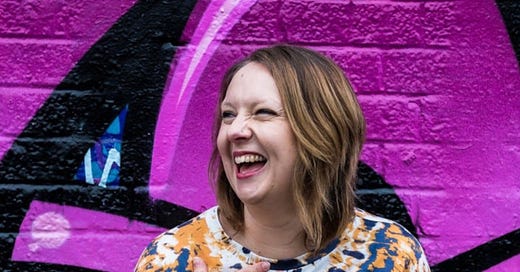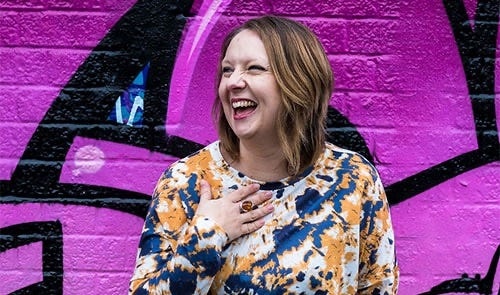The Auti Peri Q&A: Allegra Chapman
"This is our leader era, and we can lead by example and show that we deserve to live in a way that suits us, not purely to serve others."
Hi, I’m Sam (she/her). A late diagnosed neurodivergent woman, a tenacious midlife struggler, and an advocate for people in autistic perimenopause here at The Autistic Perimenopause: A Temporary Regression AKA The Auti Peri.
I am delighted to be the host of The Auti Peri Q&A Series!
In this series, I host a Q&A interview with a fellow autistic person about their experience of the menopause transition.
Everyone’s experience of the autistic menopausal transition is different. I aim to elevate the voices, lived experiences and reflections of autistic people’s menopausal transition.
Autistic perimenopause is a highly individual, dynamic and sometimes prolonged life stage caused by reproductive hormonal fluctuations. As autistics can be highly sensitive to bodily and environemntal, we may experience fluctuations as physical, psychological and cognitive symptoms.
Academic research into auti peri is in it’s early stages, yet it is a matter or urgency that we bust the social taboo and get used to talking about this.
Today’s guest is Allegra Chapman, creator of The Gathering on Substack: “This is a space for the outsiders, the misfits, the rebels… the people who never felt they quite belonged in a world that is mercilessly cruel to those who don’t live within its narrow expectations.”
Allegra Chapman is an author, columnist, ghostwriter, creativity coach and creative wellbeing practitioner. She is passionate about the benefits of creativity for mental and physical health, and wants to help people whose voices are often excluded from the cultural narrative to express themselves and share their stories. Her book, Creativity Is Your Self-Care: 52 creative therapy exercises to support your emotional wellbeing all year round, is available on Amazon.
Allegra is an AuDHD mother of two, who lives on the south coast of England, and can usually be found near the beach. In 2023, she was named as one of the most inspiring female entrepreneurs in the UK.
Substack: The Gathering
Instagram: https://instagram.com/allegra_chapman
What does “autistic perimenopause” mean to you?
Honestly, I don’t really know! I’m still figuring out myself as an autistic person, and figuring out perimenopause at the same time. I feel like I’ve had so little support and guidance on either element, that I’m still stumbling around, not quite in the dark, but in very hazy light.
I had to figure out both things for myself. I didn’t work out that I was autistic until I was in my late 30s, and I only realised I was entering perimenopause last year, although I suspect it had been sneaking up on me for a year or so previously. What the two mean in combination is a question I haven’t even begun to understand yet!
When did your autistic perimenopause symptoms start and what were/are they?
I think my first perimenopause symptom was not being able to drink alcohol! I’ve always enjoyed a drink, but all of a sudden I couldn’t have even a glass of wine without feeling instantly ill. I had friends round for dinner, and I had only two or three sips of my wine before I begun to feel the kind of sickness you normally experience when you’ve had way too much to drink. So I cut out wine. On my 40th birthday, I had a cocktail with dinner to see if maybe I was OK with spirits. I discovered I am not ok with spirits, and I couldn’t finish the drink. I haven’t had any alcohol since then, which is now just over a year. It didn’t occur to me that it could have anything to do with menopause until I started complaining to some female friends that I couldn’t drink anymore and they replied, “Oh, that happened to me / my friend when I / they started menopause.” Uh oh.
There are some other symptoms that have been creeping up for a while. A couple of years ago, I started experiencing random chest pains that seemed to come out of nowhere and then disappear for no obvious reason. When it comes on, it feels as though my heart is beating too hard in my chest. I can feel the blood throbbing. I also started experiencing extreme fatigue. I have two small children, so everyone told me, “Oh, tiredness is parr for the course,” but it didn’t just feel like tiredness. I was exhausted, sure, but it was more than that. My whole body – my bones, my muscles – felt drained, my brain felt like it was being wound up with a crank. Any movement or thought felt like wading through treacle.
I had so many blood tests and scans, but they couldn’t find anything to explain the chest pains or the fatigue. So the doctors just shrugged their shoulders and sent me away. It was only Dr Google and talking to other women that led me to understand that fatigue and heart palpitations are both menopause symptoms.
What happened if/when you presented with autistic perimenopause to a healthcare professional?
Hahahaha.
I’m in the UK, and our NHS is wonderful – to have healthcare free at the point of service whenever you need it is incredible, and I feel so grateful to have access to that. To know that, if I or a loved one are in danger, we won’t have to worry about the cost. But, unfortunately, we’ve lived through 12 years of a Conservative government whose politicians either have interests in private healthcare companies themselves or whose friends and donors do. So it’s been very much their policy to underfund and collapse the NHS. As a result, services are stretched beyond belief, and clinicians are exhausted and burnt out.
All of which means that, when I went back to the GP saying, I’m still getting chest pains and experiencing extreme fatigue, she said to me, “We’ve done all these tests and everything is normal, so what would you like us to do?”
I wanted to cry at that point. I wanted to scream, “I want you to make me better!” Instead I took a deep breath and said, “Another GP suggested considering trying HRT, is that worth a go?” She agreed to try it, and so I’ve now started my first month of HRT – I think it might be helping, but it’s early days.
It’s interesting that none of these healthcare professionals have asked about neurodiversity or mental health in any of these interactions – there’s no consideration about how they might interact. Western healthcare is very focused on individual symptoms and not on looking at people as entire beings in a holistic way.
What has your treatment protocol been in managing your autistic perimenopause?
So now I’m on HRT, and I’ve been on Sertraline for years which helps balance out my brain. I was prescribed it years ago for depression, but, since discovering I’m AuDHD, I now wonder if they accidentally prescribed me the right medication for the wrong reasons. Either way, it helps a lot.
The biggest thing for me at the moment, though, is figuring out how to build a lifestyle that is more suited to me as an AuDHD mother in perimenopause. I’ve spent my whole life trying to fit into the boxes society expected of me, and that led me to burnout and mental health challenges. So now I’m focusing on building a career I love, making time for creativity, moving and caring for my body, eating well, drinking plenty of water, staying off social media, spending time in nature… looking to live life on my own terms.
How has your everyday life been impacted by autistic perimenopause (your caring/employment responsibilities, hobbies, relationships etc.)?
The thing I find hardest is the lack of energy. I struggle to run around and play with my children, or to be as present with them as I would like to be. I know that I can be irritable with my kids and my husband, and I’m working hard to manage that.
It takes me a long time to get going in the mornings, and I need to take time to rest during the day. My husband has been amazing at stepping in to look after the kids and the house and life admin – far more than his fair share – to give me that space.
Are there things that make or have made your menopause transition especially difficult for you as an autistic person? If so, what kinds of things?
I’m finding it so much harder to keep a lid on the trickier elements of being AuDHD these days. The brain fog has been real – although I’m used to the ADHD side of my brain jumping around from one thing to another and getting distracted from tasks midway through, I’ve always been good at juggling all the plates and keeping on top of everything. I’d remember all the dates and appointments and things that were expected of me. Now I just can’t. I have to leave notes everywhere and make reminders for everything, and I still find things slipping through the cracks. I hate it, because I always felt so in control of my life, and prided myself on how much I managed “in spite of” myself. Things like sensory overwhelm are also now much harder to ignore.
Essentially, I’ve lost the ability to mask as successfully as I used to. Dr Sharon Blackie, in her book Hagitude, talks about menopause as an alchemical fire that burns away all the outer layers that you’d constructed around yourself until you’re left just with the core of who you are. I definitely relate to that. Menopause (and motherhood) is stripping away a lot of the pretence and performance in the identity that I’d constructed to please a neurotypical society, and now I’m learning to live as my authentic self.
Are there things that could make or could have made your menopause transition easier for you as an autistic person? If so, what kinds of things?
More awareness and understanding. Having people to talk to, or just more information available, to help me recognise what’s happening and be aware of what might happen, and learn tools to manage it, would make it all so much easier. That’s why projects like this are so important. We need to all talk to each other more. The healthcare system in the Western world isn’t set up to support women or neurodivergent people – it doesn’t really care about anyone except white, straight, able-bodied men. Women’s issues are dismissed. Women don’t even feature in medical studies or trials, because our pesky hormones throw off the results. We’re seen as an annoying anomaly. We’re belittled and patronised every time we try to find answers. So creating communities where we can share stories and experiences for others to learn from is vital.
What supports, resources and services are available to people experiencing autistic perimenopause where you live?
I have no idea! I wouldn’t even know where to start looking.
What kinds of services, resources or supports would you find most helpful?
Healthcare professionals need a much better understanding of a) menopause in general and b) how menopause intersects with neurodivergence. There’s a deep rooted misogyny in our current approach to healthcare that needs some serious and sustained effort to address. Similarly, the ingrained discrimination towards neurodivergent people.
What I find the most helpful is communities of women and people experiencing menopause sharing stories and support with one another. More people talking and writing about this stuff so we can all be more informed and feel less alone.
What is the easiest way for you to access information about autistic menopause?
Social media has been a big one for me. I love Substack for the communities you can find, and the depth of thought on different topics.
As a writer and bookaholic, reading books is always a go-to for me. We’re starting to see more books emerging about menopause in general, which is great, and it would be amazing to see more about neurodivergent experiences of menopause.
What would you wish for all people to know about autistic perimenopause?
Both autism and perimenopause rarely show up like the stereotypical presentations in the movies. I spent most of my life thinking that autism couldn’t possibly apply to me, because I was fairly sociable, showed my emotions, couldn’t count cards like Dustin Hoffman in Rainman, and I understood sarcasm. If society wasn’t so obsessed with these caricatures, far fewer people would have to battle through their lives trying to fit into boxes not designed for them because they didn’t understand their own brains.
Similarly, with menopause, it doesn’t necessarily manifest with hot flashes and leaving your keys in the fridge.
There are so many symptoms that we don’t think to associate with hormonal changes – muscle and joint pain, heart palpitations, fatigue, dry skin, headaches, tooth and gum pain (all of which I’ve had over the last year or two and didn’t realise it might be indicative of something bigger going on). It also starts way earlier than we’re led to believe. We think of menopause as something impacting women in their 50s, but perimenopause builds up very slowly, often from your 30s. Knowledge is power, so the more you can find out about all these different areas, the more chance you have of understanding what’s happening to you. Listen to your body and investigate the cues it gives you.
Is there anything else you’d like to share regarding your autistic experiences of menopause?
Your needs are valid. Most of us who experience menopause are women, and we’ve been conditioned since birth to think that our health (physical and mental) is an inconvenience. That our worth is based on how we are of service to parents, partners and children. So we have trouble asking for anything for ourselves, or even stating our needs.
This is even more true for autistic women, who were often misdiagnosed and dismissed for years. We’ve learned to mask and try to suppress our needs.
When perimenopause and autism collide, your needs become more pressing than ever. Now is not the time to push through. This is the time to step into your power and insist on getting your needs met as far as possible.
There’s a video doing the rounds on social media of a scientist whose name I’ve forgotten (I told you the brain fog was real!) talking about how humans are the only animals who have menopause. He talks about how it’s a strange evolutionary choice, to take one half of the species “offline” with regards to reproduction, and yet for that half to be the one with the longest life expectancy. Cis men, after all, can procreate throughout their lives, but they live less long. Why would evolution choose to do that? His hypothesis is that, because humans are a social species, we need the elder women for their wisdom and experience. They are there to guide and educate the community. They are freed from the risk and distraction of child-rearing so that they can focus on leading.
This is our leader era, and we can lead by example and show that we deserve to live in a way that suits us, not purely to serve others.
Allegra is running a writing programme specifically for women who are neurodivergent, or experiencing other challenges (like perimenopause!), who want to build a productive, sustainable and joyful creative practice.
Divergent Creatives will show you how to let go of limiting beliefs, understand your unique needs and strengths, and build an approach that works for YOU.
Registration closes on 31st January, and there are only a few places left, so sign up quick here!
I hope you enjoyed this Q&A. If you would like to be featured as part of this series, please message me. I’d love to share your story!








So lovely to hear Allegra’s story. And so many parallels. I hope the HRT works for you.